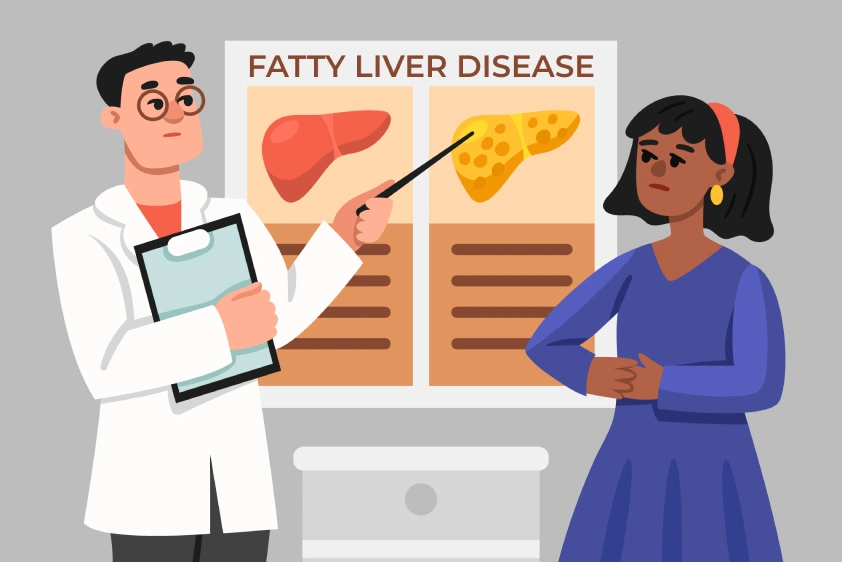Understanding Fatty Liver Disease: Causes, Symptoms, and Treatment Options
Many people are unaware they have fatty liver disease, as it often goes unnoticed until discovered during routine medical exams. This condition is closely tied to our everyday lifestyle choices—things like diet, alcohol intake, and physical activity—but it doesn’t always come with obvious warning signs. So, what exactly is fatty liver disease? How do you know if you might be at risk, and what can you do about it? In this article, we’ll break down the key facts, from understanding the causes and symptoms to exploring effective fatty liver treatment options, and how to take steps to prevent it from progressing.
What is Fatty Liver Disease?
Fatty liver disease develops when excess fat accumulates in the liver cells, overwhelming the liver’s ability to break it down and store it properly. Under normal conditions, the liver contains minimal fat, but with this disease, fat deposits accumulate, leading to liver inflammation. If this inflammation persists, it can cause scarring, which can progress to cirrhosis, a severe form of liver damage that can impair liver function. Fatty liver disease is classified into two primary types: Non-Alcoholic Fatty Liver Disease (NAFLD), which is often linked to lifestyle factors like unhealthy diets, obesity, and conditions such as type 2 diabetes; and Alcoholic Fatty Liver Disease (AFLD), which results from alcohol abuse. Both forms can lead to serious liver complications if left untreated. NAFLD is more common, especially in people with metabolic syndrome, while AFLD can develop with long-term heavy drinking. If left untreated, both forms of fatty liver disease may lead to cirrhosis or liver failure and, in some cases, liver cancer.
Causes of Fatty Liver Disease
Fatty liver disease can develop for various reasons, most of which are tied to lifestyle and metabolic health. One of the primary causes is a diet rich in processed foods, refined sugars, and unhealthy fats, which promotes fat accumulation in the liver. Excess weight, high cholesterol levels, and impaired glucose regulation such as in type 2 diabetes, are major contributors to fatty liver disease. Alcohol abuse is the leading cause of AFLD, while NAFLD is often linked to poor dietary choices and metabolic issues. Genetics can also increase the risk, meaning even those who avoid alcohol or maintain a healthy lifestyle may still be susceptible if the condition runs in their family. While being overweight or having diabetes doesn’t guarantee the development of fatty liver disease, it significantly raises the likelihood.
Symptoms of Fatty Liver Disease
Fatty liver disease can be difficult to detect early because it often doesn’t show obvious symptoms. However, as the condition worsens, some signs may begin to emerge. Here are the symptoms to watch out for as the disease progresses:
- Fatigue: Feeling unusually tired and low on energy, even after rest.
- Discomfort in the upper right abdomen: Pain or a sense of fullness under your ribs on the right side.
- Unexplained weight loss: Losing weight without making changes to your diet or activity levels.
- Weakness or confusion: As liver function declines, cognitive impairment or general weakness may occur.
- Jaundice: A sign of more advanced liver damage.
- Swelling in the legs and/or abdomen: Fluid buildup, known as edema or ascites, due to poor liver function.
If you notice any of these symptoms, visit a Hepatology Clinic in Dubai to get a proper evaluation.
Treatment Options for Fatty Liver Disease
Treating fatty liver disease primarily involves making lifestyle changes, as no single medication directly targets the condition. Here are the key approaches to fatty liver treatment:
- Weight loss: Shedding even a small portion of body weight can decrease the fat level in the liver, leading to better overall liver function and health.
- Balanced diet: Eating a diet including fruits, vegetables, lean proteins, and whole grains while skipping processed foods, sugars, and unhealthy fats is crucial.
- Regular physical activity: Increasing physical activity, such as daily exercise or strength training, can help improve liver function.
- Managing underlying conditions: Doctors may prescribe medications to control diabetes, high cholesterol, or high blood pressure, which can contribute to fatty liver disease.
- Advanced treatments: If the condition worsens and leads to cirrhosis, more intensive interventions like liver transplantation may be necessary.
Early detection and consistent treatment can often reverse or halt the progression of the disease. For personalized guidance, consider visiting a Hepatology Clinic in Dubai for a tailored treatment plan.
While fatty liver disease can sound alarming, the good news is that it’s often preventable and manageable with the right approach. By staying on top of your health, making informed lifestyle choices, and seeking medical advice, you can protect your liver and lower the risk of complications. If you’re concerned about your liver health or need help managing the condition, consider visiting a Hepatology Clinic in Dubai or your local healthcare provider.





